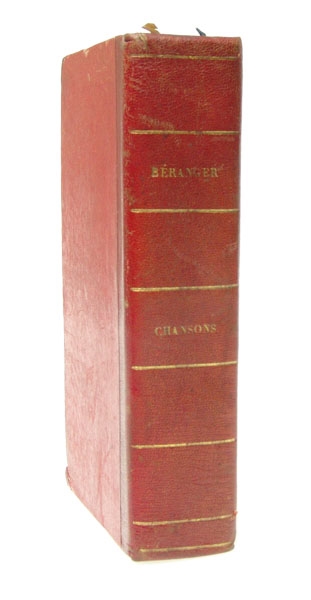BÉRANGER, M.J. P. de
Chansons, Tome I-II (all) + Chansons Nouvelles.
Paris, Didot, 1821 + Paris, Plassan, 1825. 8vo. Bound uncut in one nice cont. red hcalf with gilt back. Bdg. w. a few traces of use. Some brownspotting. Printed on good paper. Woodcut vignettes to all three title-pages and several text-vignettes in the last work.
First editions of both parts of Beranger's "Chansons". Béranger's famous and influential song appeared in five parts in all, beginning with the "Chansons morales et autres" in 1816. The two present collections constitute part two and three. The first part from 1816 is extremely scarce, but this second part, merely called "Chansons", is probably the most interesting and noteworthy off all the song-collections, as well as being the most comprehensive. "Une édition plus complète parut en 1821, 2 vol. in 18, Paris, Firmin Didot. Cette édition, résultant d´une souscription patronnée par le banquier Laffitte et A.-S. L- Bérard, fut tirée à 10,000 exemplaires; elle fut pursuivie, et l´auteur, quoique habilement défendu par M. Dupin l´aîné , fut condamné á trois mois de prison et á 500 fr. d´amende." (Brunet 1, pp. 781). The author was prosecuted and condemned to imprisonment for three monts because of the appearance of this edition. The two last parts, "Chansons inédites" and "Chansons nouvelles et dernières" appeared in 1828 and 1833.
These two collections contain some of the most important of Béranger's songs, among these the influential Napoleonic ones. His songs develloped from being joyous odes into strong satirical and political songs; -"le gouvernement clérical et rétrograde de la Restauration fut particulièrement visé avec une verve mordante et caractéristique. C'est pour cela peut-être qu'il est un des plus grands créateurs de la légende napoléonienne, car il oppose l'époque glorieuse de l'Empire à la mesquinerie qui lui succéda." (Lafont-Bompiani, I:368). His obvoiusly satirical tone partly explains his great political influence at the time, -he is a master of portraying the Bourbon government, clericalism, the old reactionary nobility, and as a contrast the glorious souvenirs of Napoleon.
"Voltairienne, sentimentale mais frivole, politique et satirique mais avec simplicité, évitant toute complication de doctrine et toute morale tragique, la poésie de Béranger est la représentation typique de cette première partie du XIXe siècle où la société est encore imbue des moeurs et des idées du XVIIIe et où le romantisme a peine à effacer complètement les formes littéraires et l'esprit de l'ancien régime." (Bompiani I, pp. 368.).
Carteret I:134.
Order-nr.: 31265

